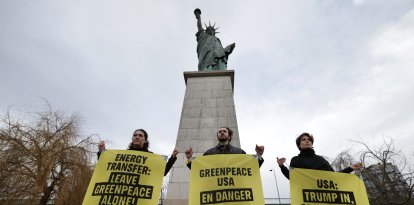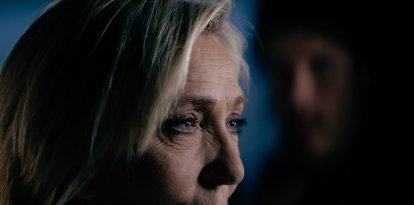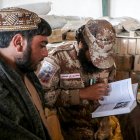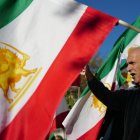International Women's Day: A call not to forget the women who are truly oppressed
While the left in the West demands rights for women in places where they are fully recognized, in countries such as Iran and Afghanistan, among others, atrocities against women are on the rise.
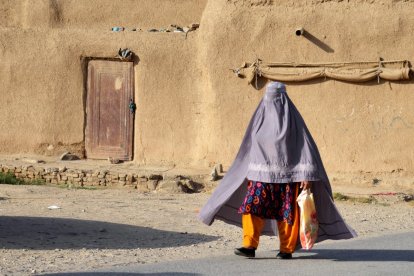
An Afghan woman in Kandahar, Afghanistan
On International Women's Day it is absolutely necessary to call for the rights and freedom of women in the places where they are really oppressed, which is mainly in Islamic countries, in places hit by radical Islamist groups or in certain Islamic societies, including in the West.
The voices that are heard mainly in Western leftist circles, who use the feminist cause, like so many others, to hide their true intentions of imposing socialism and destroying the West, should be ignored.
While the left in the West demands rights for women in places where they are fully recognized, in countries like Iran and Afghanistan, among others, the atrocities committed against women are intensifying. It is truly absurd.
Good people who really care about women, that is, those outside the U.N., which only cares about condemning Israel in its defense against genocidal Islamist terrorists, should demand women's freedom and rights in those places where they are really needed. While oppression of this kind happens in many places around the world, we can take a few emblematic cases so as not to forget the women whose freedoms are significantly curtailed.
'A slow death' in Afghanistan
The Taliban government in Afghanistan issued a series of laws in 2024 to further curtail the freedoms of its citizens, including a ban on the sound of women's voices in public.
Among the new rules, which were issued after being approved by Supreme Leader Hibatullah Akhundzada, it is also stated that women must cover their bodies in public spaces, mainly their faces, to avoid tempting themselves and others. They must also cover themselves in front of non-Muslim men and women so as not to corrupt themselves.
In addition, laws issued by the Islamic fundamentalist regime indicate that women must wear clothing that is neither tight nor short.
Regarding public transportation, the new rules prohibit drivers from transporting adult women without a legal male guardian and oblige passengers and drivers to perform prayers at designated times.
Young Afghan activist Laila Basim wrote an article last August in the Spanish newspaper El Pais in which she described the hard lives of women in Afghanistan since the Taliban regained power in 2021 following the chaotic U.S. exit under the Biden administration.
Basim, who now resides in the United States with her husband and three children, called life governed by the Taliban government's laws in the country a "slow death." In fact, she explained that she and other women lost their jobs due to the tight restrictions of the radical Islamists currently ruling Afghanistan.
She said that she was fired from the Ministry of Economy after the Taliban took power in the country and was forced to stay confined to her home without the possibility of fulfilling her dreams.
Basim explained that the Taliban has banned women over the age of 12 from attending schools and universities, expelled women from their positions in the state, and prohibited them from traveling more than 45 miles without the company of a man or choosing a husband, among other repressive measures.
The young author maintained that she had a miscarriage due to beatings received at the hands of Taliban forces during a protest in 2022, saw a young neighbor girl killed by her brother for refusing to submit to a forced marriage, witnessed a stoning of two women because they were not wearing a veil, and firing squad mow down clerics branded as infidels, among other atrocities. In addition, she commented that on repeated occasions, she saw young women killed in the street.
Basim did not hide her disappointment with the media, as she indicated that these events are not usually covered by the international press. What a surprise! No Jews, no news.
Basim also claimed that she had to close the Zan library, which means woman in the Dari language, founded by her and other activists to promote reading and culture among Afghan women, due to harassment by the Taliban.
Mahsa Amini, symbol of resistance against regime oppression in Iran
The case of Mahsa Amini, a young Iranian Kurdish woman killed by the Morality Police in Iran in 2022 for not properly wearing a hijab, shocked the world and became a symbol of resistance against oppression against women and opponents by the Iranian regime.
Eyewitnesses said Mahsa Amini, 22, was beaten while inside a police van.
The young woman's murder sparked a wave of protests in Iran under the slogan "Woman, Life, Freedom," which were brutally repressed by the regime, which killed hundreds of people and arrested thousands.
A few days after the first anniversary of Mahsa Amini's killing, the Iranian Parliament passed a law that enforces penalties for women who do not wear a hijab in public places. The regulation establishes penalties such as prison sentences of up to five years, fines of up to $2,000, confiscation of cars and a ban on driving, in addition to deductions from salary, employment benefits or a ban on access to banking services.
In early 2024, the Iranian regime increased oppression against women in Iran. The Revolutionary Guard Corps deployed the "Safirane Mehr" (Ambassadors of Affection) throughout the country: "trained groups" in charge of controlling women's use of hijabs.
Narges Mohammadi, the Nobel Peace Prize winner imprisoned in Iran
In addition to Amini's case, another woman symbolizing resistance against the Iranian regime is Nobel Peace Prize winner Naarges Mohammadi, who is imprisoned in Iran. At the end of last year, Iranian authorities had to hospitalize her after almost nine weeks of denying her treatment. Activists fighting for the activist's release said at the time that Mohammadi should be given comprehensive treatment for her multiple ailments, as a simple transfer would not resolve the serious health problems caused by months of malpractice, neglect and deprivation.
Mohammadi is being held in Iran's Evin prison, which houses other political prisoners and people with ties to the West.
Israel rescued young Yazidi girl in Gaza
The State of Israel, a country suffering from the antisemitic obsession of the U.N. and various organizations claiming to defend human rights, rescued a 21-year-old Yazidi woman in late 2024 in the Gaza Strip who had been kidnapped from her home in Iraq in 2014.
Fawzia Amin Sido was taken to Syria after being abducted by ISIS, where a Hamas terrorist bought her and took her to Gaza.
The Israel Defense Forces (IDF) claimed that the terrorist who acquired Sido was killed during the war in Gaza, probably in an Israeli offensive.
It should be recalled that in 2014, ISIS launched a campaign of conquests in which it seized a third of Iraq and large parts of Syria. At that time, this Islamic terrorist group carried out a genocide against the Yazidis, whom they consider infidels.
It is estimated that ISIS terrorists murdered some 5,000 Yazidis and captured some 7,000 women, teenagers and girls belonging to this minority, who were turned into sex slaves.
RECOMMENDATION



